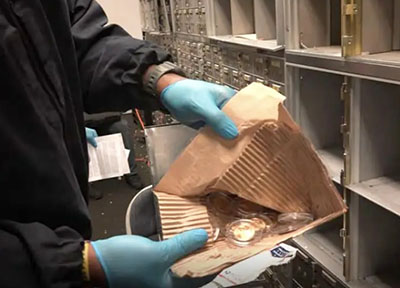by WorldTribune Staff, January 8, 2024
The 9th Circuit Court of Appeals will decide whether the FBI overstepped its authority when in March of 2021 it seized the contents of 1,400 safety deposit boxes from U.S. Private Vaults in Beverly Hills, which was accused of money laundering.
The owners of most of the safety deposit boxes were not charged with any crimes. The appeals court heard from both sides in a hearing on Thursday.

FBI agents on March 22, 2021 took about $86 million in cash from the boxes, as well as jewelry, gold bars and coins, silver, and other valuables. In May of 2021, the FBI “commenced administrative forfeiture proceedings” against an unspecified number of the boxes, according to court documents.
Civil asset forfeiture is the process through which the government seizes money or other property believed to be linked to a crime without ever charging the owner.
U.S. Private Vaults eventually pleaded guilty to money laundering.
Several individuals who rented safe deposit boxes at the facility who haven’t been charged filed a class action lawsuit accusing the government of violating their Fourth Amendment protection from unreasonable search and seizure and their Fifth Amendment protection from having private property taken without compensation.
Attorneys from the Institute for Justice said the FBI “broke open hundreds of safe deposit boxes, and then it tried to civilly forfeit everything in those boxes worth over $5,000” without any probable cause.
“The search … had an objective function to uncover evidence of crimes,” Institute for Justice senior attorney Rob Johnson told Fox News.
The Institute for Justice wants the appeals court to definitively state that the FBI violated individuals’ rights and to force the federal government to destroy copies it made of customers’ private documents — including medical records, wills and trusts — while agents searched the boxes.
The appeal comes after a lower court last year sided with the FBI.
Unsealed court documents showed the FBI and U.S. Attorney’s Office never told the judge in their warrant request that they planned to confiscate the contents of every box containing at least $5,000 in cash or belongings.
The warrant only authorized agents to seize business computers, money counters and surveillance equipment. The judge also allowed the FBI to seize safety deposit boxes and keys, but specifically wrote that agents should only “inspect the contents of the boxes in an effort to identify their owners … so that they can claim their property,” and that the warrant “does not authorize a criminal search or seizure of the contents of the safety deposit boxes.”
During Thursday’s court appearance, Victor Rodgers argued on behalf of the government that the FBI went above and beyond to reunite customers with their property by posting a notice on the window of U.S. Private Vaults.
“All they had to do was contact the FBI,” Rodgers said.
Judges on Thursday grilled the government’s attorney on whether the FBI ignored the warrant’s limitations, why agents needed to open the seized boxes, and why drug-sniffing dogs were present during the seizure, a move the Institute for Justice alleged was taken solely for the purpose of uncovering evidence of crimes.
“It was really nice to hear the judges ask questions that seemed to put the counsel for the FBI on the back foot,” said Jeni Pearsons, a nonprofit director who rented a box at the Beverly Hills facility. “That they were being truly questioned about the morality of what happened … it was a good feeling to be there in court today.”
“I think the public sees this and recognizes that this is just a total abuse of people’s constitutional rights,” Johnson told Fox News, adding that he felt “extremely optimistic” about the appeals court’s forthcoming decision.
Tomorrow, I’m flying to Los Angeles for oral argument in what may be the most important Fourth Amendment case pending in the United States today. The basic facts: The FBI broke open and searched hundreds of safe deposit boxes without any reason to think the boxholders did… pic.twitter.com/B2HtAjN41a
— Rob Johnson (@FreeRangeLawyer) December 5, 2023
Publishers and Citizen Journalists: Start your Engines
